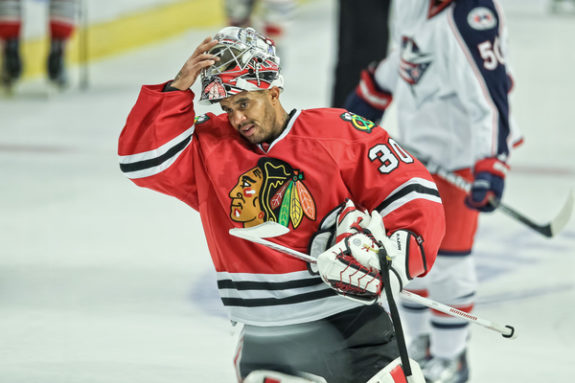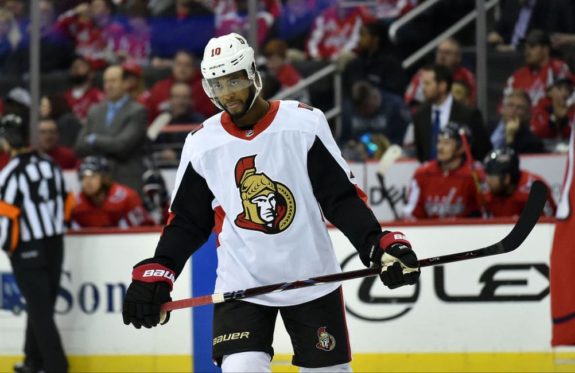During Black History Month this February, the NHL is highlighting Black Hockey History and the Black players that have changed hockey. The Ottawa Senators joined the NHL in honoring Willie O’Ree by wearing helmet decals celebrating equality throughout Black History Month. The Senators have a lot to recognize when it comes to Black players in its team’s history. As through 29 years as a franchise, the Senators have had five Black players on their roster represent the Canadian capital.
Ray Emery
Emery is the most experienced Black NHLer in Senators’ history. The goaltender spent six seasons in the Ottawa Senators organization between 2002-2008. Emery made his NHL debut with Senators during the 2002-03 season, playing three games and posting a goals-against average (GAA) of 1.41. He then went back to Binghamton (AHL) but was recalled the next season in 2003-04 season, playing another three games, posting a GAA 2.38.
He then played parts for three seasons straight with the Senators in the NHL, where he led the Senators to the Stanley Cup Final in 2006-07, where they lost the series 4-1 against Anaheim in the finals. Emery would get his Stanley Cup championship, just not with the Senators, but instead with the Chicago Blackhawks in 2013.

Although Emery was a goalie, he was known for not letting his goalie pads get in the way of dropping his mitts. One of his most famous brawls was with Buffalo’s Martin Biron in a game between the Sabres and the Senators on Feb. 22, 2007.
Emery was subject to a racial incident that affected the Binghamton Senators. On July 6, 2003, the Senators signed forward Denis Hamel. Hamel had a history with Emery in an incident where Hamel admitted to calling Emery a racial slur when he played for the Rochester Americans in the AHL against Emery and the Binghamton Senators. When Hamel joined the Senators, he reportedly apologized to Emery, and the two played against each other in the 2004-05 season.
“Hockey is a game where guys trash-talk a lot, so during the course of a game, I have had guys bring up racial stuff to try to get under my skin. I don’t think that should happen, but at the same time, I don’t shy away from trying to get under other guys’ skin, too, so I choose the times to stick up for myself and choose times to let it slide off my back. But, really, it has only happened a handful of times in my career. It hasn’t happened in the NHL, but it did happen a few times in the American Hockey League and in junior.”
Ray Emery, ESPN
Graeme Townshend
Townshend is a former NHL forward originally from Jamaica and is the first Jamaican-born player to ever play in the NHL. He made his NHL debut for the Boston Bruins, eventually playing for the New York Islanders. In the 1993-94 season, Townshend played 14 games for the Senators. The following season, he played for Ottawa’s AHL affiliate, the Prince Edward Island Senators. He hung up the skates after the 1998-99 season, but that wasn’t the end of hockey for him.
Townshend began his coaching career the next year, becoming head coach for the Macon Whoopee of the CHL and then for the Greensboro Generals of the ECHL. He also coached at the NHL level, becoming the player development coordinator for the San Jose Sharks. At his position, he prepared Sharks’ players and prospects with all-rounded skills, also notably skating skills.
From 2008 to 2012, Townshend was employed with the Toronto Maple Leafs as their skating coach. Working with the Leafs, as well as the Toronto Marlies, to improve skating performance. In 2006, he was inducted into the Canadian Black Hockey Hall of Fame, joining Willie O’Ree, someone who he looked up to throughout his career. (from ‘Townshend, first black Isles player, inspired by O’Ree,’ Newsday, 02/07/2010) In 2011, he connected with his Jamaican roots when he became head coach of the Jamaica men’s national junior team in the Jamaican Olympic Ice Hockey Federation. Townshend is helping to expand the game of hockey all the way to Jamaica.
Anthony Duclair
Duclair is the youngest and most recent of players to play for the Senators. He was drafted by the New York Rangers in the 2013 NHL Draft. After playing parts of five seasons in the NHL for the Rangers, Arizona Coyotes, Blackhawks, and Columbus Blue Jackets, he came to the Senators in the trade that first sent Ryan Dzingel out of Ottawa. Duclair played parts of two seasons from 2018-20 with the Senators, scoring 31 goals and posting 23 assists. His high-scoring tendencies landed him the to represent the face of the Senators at the 2019-20 NHL All-Star game in St. Louis. (from ‘Senators winger Anthony Duclair is headed to the NHL All-Star weekend,’ Ottawa Sun, 12/30/2019)

In late 2020, Duclair became a free agent and signed with the Florida Panthers, where he plays today. After its formation in the summer of 2020, Duclair became an inaugural executive board member of the Hockey Diversity Alliance, an alliance formed to end racism in hockey.
“You hear so many kids year after year quit hockey because they don’t want to go through [hearing racial taunts],” Duclair said on the call, which was hosted by filmmaker Charles Officer. “We really want to bring awareness that there is a racism problem in hockey, and whoever thinks otherwise, whoever has any backlash over that statement, is part of the problem because we have lived through it.“
Anthony Duclair, NHL.com
Greg Mauldin
Mauldin is a former NHL forward from Holliston, Massachusetts, who the Blue Jackets drafted in the 2002 NHL Draft. He made his NHL debut for the Blue Jackets in the 2003-04 season but only played six games. He then spent seven seasons playing in the AHL and playing in Sweden. Mauldin spent parts of two seasons with the Binghamton Senators, scoring 39 goals and posting 45 assists between 2007-09. He then played in the NHL with the New York Islanders for one game and played part of the 2010-11 season with the Colorado Avalanche. He hung up his skates in 2019 after a stint in the KHL. Mauldin’s impact in hockey didn’t stop there, however, as in 2020, he became the first Black coach in the USA Hockey National Team Development Program Under-18 team.
“I never really sought out to be that person, but it’s an honor,” Mauldin said. “For everyone or anybody, you need somebody to look up to or someone to follow. I guess I can be that person for somebody out there. It’s pretty cool to have that honor, and hope I can make the most of it.”
Greg Mauldin, NHL.com
Chaz Johnson
Johnson is a former hockey forward from Montreal, Quebec. He began his AHL career in the 2005-06 regular season with the Milwaukee Admirals. Although Johnson never got to play an NHL game, he spent parts of two seasons with the Binghamton Senators. Between 2007-09, he played a total of 48 games with Binghamton, recording a goal and five assists. The same two seasons that Johnson played were also the same two seasons Mauldin played for Binghamton. Unlike Mauldin, however, Johnson never got a chance to play in the NHL and hung up the skates in 2012 after a season with the Springfield Falcons. Despite a career that at its highest point only saw the AHL, Johnson’s time in the Senators’ organization advanced representation in their franchise.
Moving Forward
Although the recognition of the Black players that have impacted Senators’ history is the first step to racial equality in hockey, it is a small step. Some NHL teams have created roles to better address and improve issues of inclusion within hockey. Most recently, the Toronto Maple Leafs appointed former defenceman Mark Fraser to the role of Player Development, Equity, Diversity, and Inclusion. With this, the Senators need to follow in their provincial rivals’ footsteps. The Senators can’t depend on their Black players to independently fight for the improvement of racial inclusion in their NHL teams and even in their farm systems. It’s important for the Senators to understand that wearing a decal on your helmet is not enough to make hockey reach a wider range of not only players but also fans.